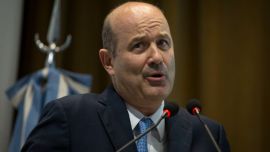President Alberto Fernández seems to share a predilection for work trips overseas with Mauricio Macri. Far from the turbulence and noise of the hand-to-hand political combat that occurs in Buenos Aires, the Peronist leader and his team could focus on delivering lofty speeches promising to help curb global warming while holding bilaterals with important global leaders. They even managed to sneak a picture with US President Joe Biden in there. Far away from his vice-president, Cristina Fernández de Kirchner, and distanced from an electoral campaign that appears to have been put on mute, Alberto seems to have enjoyed his time “scoring goals” such as getting some of Argentina’s points in the final G20 communiqué or holding a 90-minute working meeting with International Monetary Fund chief, Kristalina Georgieva.
Argentina’s international agenda had moderate pretensions. It didn’t really matter whether it was the G20 summit or the COP26 UN Climate Change conference, President Fernández needed to show himself as the proactive leader of a country that has a say in world affairs, even if we don’t. He needed to bring up the issue of the unfairness of the global financial system, particularly with highly-indebted lower and middle-income nations. And, of course, plead Argentina’s case with the IMF so that the whole world could see. Given the circumstance, he was forced to speak about climate change and measures to tackle rising emissions, even though it is highly unlikely he’s dedicated much time or thought to the issue in his political life.
Indeed, according to the Climate Action Tracker, a research group that monitors country progress toward the Paris Agreement goals, Argentina’s policies and actions are rated “highly insufficient,” meaning they would result in global temperatures rising more than four degrees Celsius by the year 2100. Argentina’s own targets presented within the Paris Agreement are considered “insufficient,” meaning they would result in global temperature increases above three degrees Celsius, when the accord aims at well below 2 degrees, and preferably 1.5. Fortunately for us, we are relatively insignificant in this battle, given Argentina ranks 30th in the world in CO2 emissions, 50 times less than the number one offender, China, and 25 times less than the United States, which came in second. Of course it is extremely important that every nation does their part in tackling the issue of global warming, but the real battle will be fought out by a group of countries that include the most populous, most industrialised, the fastest growing. None of which include Argentina.
The modest expectations of the Argentine delegation also contrast with the relevance of the message they took to Rome and Glasgow. While we’re still trying to figure out how to convince Fernández de Kirchner and her son Máximo that the country needs to reach a restructuring agreement with the IMF, the issue of how to finance the green transition, particularly in developing countries, is front and center. The relationship between poorer countries and the IMF, and the geopolitical rift lines between the US, the European Union, China, Russia, and certain other key players continues to define the real possibility of access to financing needed to lift populations out of poverty, face the global Covid-19 pandemic, and invest in renewable energy. Most analysts seem to agree that world leaders use these summits as “greenwashing” opportunities, allowing them to show themselves concerned over global warming, making ambitious promises for future governments to dismiss when faced with the economic and political costs.
One key issue has to do with the use of fossil fuels, and the price of transitioning to green energy. In Argentina, energy costs are subsidised by the government, and they represent one of the largest components of our runaway deficit. In a private meeting with Economy Minister Martín Guzmán, Cristina is thought to have explained how hiking utility bills too aggressively cost Macri re-election. Since then, her sector of the ruling Frente de Todos coalition has pressured Guzmán to increase spending aggressively in order to reach the deficit levels projected in his budget. Thus, energy subsidies will remain elevated, incentivising the use of electricity and vehicles that rely on fossil fuels to operate.
That seeming contradiction is similar to the one posed by Vaca Muerta, the second-largest shale reserve in the world, considered one of the most important national projects by successive governments led by Cristina, Mauricio, and Alberto. The successful development of Vaca Muerta as a productive shale oil and gas basin would allow Argentina to be energy self-sufficient, meaning no more spending hard earned dollars on oil and gas imports. The country could even become a net exporter, initially to bordering nations and possibly to the world. The country has a massive opportunity in fossil fuels, which requires a large investment, yet this also clashes with the idea of reducing carbon emissions to tackle climate change.
While Alberto and his team are content with their overseas performance, the situation in the country continues along its usual mediocre path. As Macri battles a judge from Dolores and Cristina tries to remain out of sight, the black market peso-dollar exchange rate has hit record highs while inflation remains stubbornly high. Rather than arguing about real issues, political candidates are content with verbally attacking one another on TV. The issue of how to finance the green transition and whether Vaca Muerta is really the future or not is left for other moments, or overseas trips.




















Comments